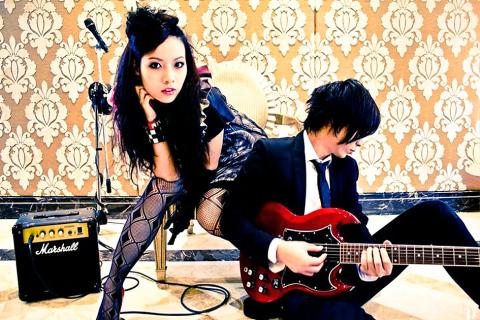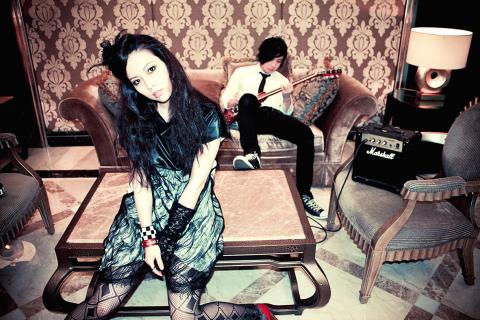Indie electronica/rock duo Astro Bunny (原子邦妮) is that rare thing: a band with a storyteller’s point of view.
The outfit will perform one set for its debut concert at Riverside Cafe (河岸留言) on Wednesday evening. The group is comprised of vocalist/lyricist Lena Cha (查家雯 a.k.a. 查查) — the former front-girl for the indie band Cherry Boom (櫻桃幫) — and bassist/producer Jay Cheng (程杰).
“We named the group ‘bunny’ because I love bunnies and I forced him to like them too,” Cha laughed in an interview with the Taipei Times three weeks ago. “I picked the word “astro” because I’m an anime and computer game geek.”

Photo courtesy of Astro Bunny
The group released its first EP What If There’s No Tomorrow (如果沒有以後) a month ago and will support the release with this concert.
“The astro bunny will lead you to a parallel universe where the ancient and the modern clash in a musical atmosphere,” Cha said, explaining that their electronica is crafted through the juxtaposition of literary ancient Chinese prose and contemporary electronica melodies. The resulting music is a combined composition.
“Because of the neutral nature of the synthesizer used to create electronica sounds, this seemingly lifeless music doesn’t feed you with predetermined themes,” Cha explained. “Rather, it allows you to interpret and imagine meanings according to your mood at the time.”

Photo courtesy of Astro Bunny
The five-track EP is conceived as a concept album and a storybook. The Intro depicts the beginning when nothing exists. Then an explosion takes place, followed by the track The Milky Way (銀河). With the title track What If There’s No Tomorrow, the two imagine the apocalypse of 2012, but resolve to hold on to their love. Flower Blossoms and Moon Round (花好月圓) was originally written by Cheng for indie icon Sandee Chan (陳珊妮) but is transformed into an electronica gem with literary lyrics. The closing track That Day (那天) is an electronica ballad about encountering a former lover and reminiscing about what might have been.
“Electronica is a form that demands a mixture of visual and musical presentation,” Cha said. “We want to bring video artists, VJs and lighting designers together to enhance the experience of our concerts in the future.”
On the cover and inside illustration of the EP there are photographs by Cha taken with an iPhone app that transforms them into designs. She plans to push this concept further to release a photo album with iPhone shots and also a storybook album.
“The possibilities of electronica are endless,” she said. The group plans to release its first full-length album at the end of this year.

Taiwan has next to no political engagement in Myanmar, either with the ruling military junta nor the dozens of armed groups who’ve in the last five years taken over around two-thirds of the nation’s territory in a sprawling, patchwork civil war. But early last month, the leader of one relatively minor Burmese revolutionary faction, General Nerdah Bomya, who is also an alleged war criminal, made a low key visit to Taipei, where he met with a member of President William Lai’s (賴清德) staff, a retired Taiwanese military official and several academics. “I feel like Taiwan is a good example of

March 2 to March 8 Gunfire rang out along the shore of the frontline island of Lieyu (烈嶼) on a foggy afternoon on March 7, 1987. By the time it was over, about 20 unarmed Vietnamese refugees — men, women, elderly and children — were dead. They were hastily buried, followed by decades of silence. Months later, opposition politicians and journalists tried to uncover what had happened, but conflicting accounts only deepened the confusion. One version suggested that government troops had mistakenly killed their own operatives attempting to return home from Vietnam. The military maintained that the

Jacques Poissant’s suffering stopped the day he asked his daughter if it would be “cowardly to ask to be helped to die.” The retired Canadian insurance adviser was 93, and “was wasting away” after a long battle with prostate cancer. “He no longer had any zest for life,” Josee Poissant said. Last year her mother made the same choice at 96 when she realized she would not be getting out of hospital. She died surrounded by her children and their partners listening to the music she loved. “She was at peace. She sang until she went to sleep.” Josee Poissant remembers it as a beautiful

Before the last section of the round-the-island railway was electrified, one old blue train still chugged back and forth between Pingtung County’s Fangliao (枋寮) and Taitung (台東) stations once a day. It was so slow, was so hot (it had no air conditioning) and covered such a short distance, that the low fare still failed to attract many riders. This relic of the past was finally retired when the South Link Line was fully electrified on Dec. 23, 2020. A wave of nostalgia surrounded the termination of the Ordinary Train service, as these train carriages had been in use for decades